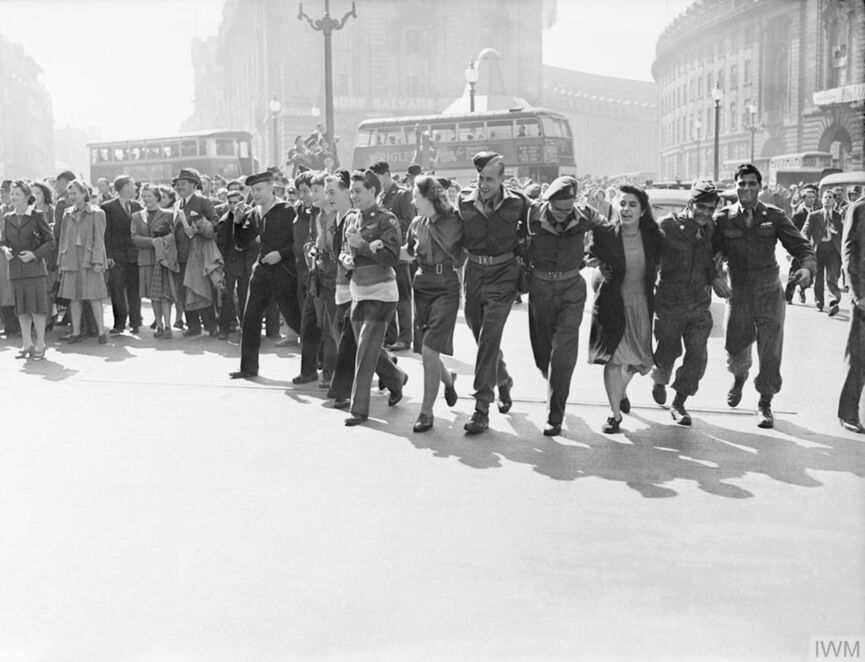
On 8 May 1945, Britain erupted into celebration. Crowds thronged Trafalgar Square, bunting fluttered in every street, and music from dance halls flowed into the night. Victory in Europe was finally here. But for tens of thousands of British and Commonwealth servicemen and women, the war was far from over.
In the jungles of Burma, the heat of Singapore, and the prisoner-of-war camps of Thailand, the fighting — and the dying — continued. Japan had yet to surrender, and the brutal war in the Pacific raged on.
Three Years Without Home in the Far East
For many, the Far East meant three years of relentless service without a single visit home. Even a three-day leave was meaningless when the journey itself would take weeks. Their war would only end with Japan’s defeat.
Around 300,000 Allied troops were held in Japanese prison camps. Just 200,000 would survive. Torture, executions, and back-breaking labour were daily realities. Rations were meagre: a tin of boiled rice, perhaps a cup of river water. Disease ran rampant — beriberi, dysentery, and malaria claimed lives as surely as bullets.
The Death Railway & Forgotten Asian Labourers
In this weakened state, prisoners were forced to build the infamous Thailand–Burma Railway, later known as the Death Railway. Some 16,000 Allied POWs perished during its construction, alongside an estimated 80,000 Asian labourers — conscripted from across Japanese-occupied territories — who endured the same starvation, disease, and beatings. Their stories are often forgotten.
At night, the worksite at Hellfire Pass glowed eerily in the torchlight — a sight so haunting the men named it after the underworld.
To avoid the dangers of Allied shipping attacks, Japan needed a land route for supplies. Prisoners built bridges across rivers, including the now-famous steel bridge over the River Kwai, replacing a wooden span completed only months earlier in 1943.
Hiroshima, Nagasaki, And The Final Blows
By summer 1945, Japan’s defeat seemed inevitable but far-off. Then came Hiroshima. On 6 August, at 8:15 am, the American B-29 bomber Enola Gay, piloted by Colonel Paul Tibbets, released “Little Boy” over the city. In moments, 80,000 people were dead. Sixteen hours later, President Truman issued an ultimatum: surrender, or “expect a rain of ruin from the air, the like of which has never been seen on this earth.”
On 8 August, the Soviet Union declared war on Japan and invaded Manchukuo. Hours later, the second atomic bomb, “Fat Man,” fell on Nagasaki.
Women also served in the Far East campaigns, from nurses tending the wounded in field hospitals to codebreakers intercepting Japanese signals, and administrative staff keeping operations moving. Many endured dangerous conditions and were taken prisoner when territories fell.
For troops still fighting in the jungles, news of Hiroshima and Nagasaki was met with a mix of shock, relief, and disbelief. The bombs signalled that the end was finally near, but until orders came through to stand down, the fighting — and dying — continued.

Surrender and VJ Day 1945 Celebrations
On 14 August 1945, Emperor Hirohito addressed the nation by radio — an unprecedented act — announcing Japan’s surrender. The next day, 15 August, the streets of Britain once again filled with celebration. For those who had endured captivity and combat in the Far East, VJ Day 1945 was more than a victory — it was release.
The formal surrender took place on 2 September aboard the USS Missouri in Tokyo Bay. Japan’s defeat ended not only the Second World War but also its colonial rule of Korea. King George VI marked the moment:
“The surrender of Japan has brought to an end six years of warfare which has caused untold loss and misery to the world.”
Remembering the Forgotten Front
Today, VJ Day stands as a reminder that victory came at a price paid far from Europe’s shores. It honours those who fought on in the final, brutal months — and those who never came home. It also calls on us to remember the other frontlines of war — the railway cut through jungle, the hospital tents in monsoon heat, and the prisoners who waited years for freedom.


